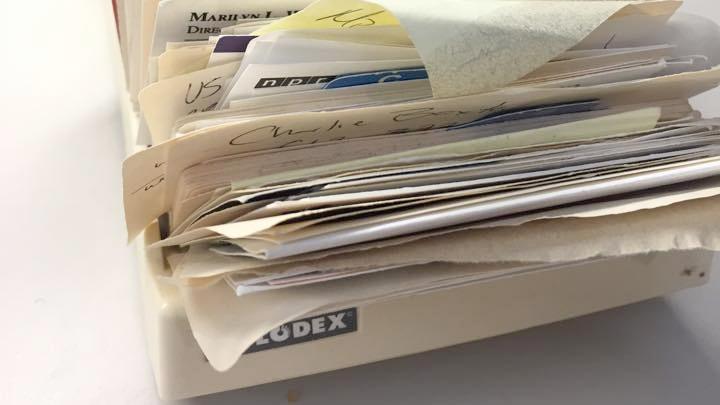What’s a Rolodex? And should she keep it?
The Rolodex on Tamar Charney's former desk at Michigan Radio.
Most of the papers, files, books, plastic toys and recordings that cluttered my office were easy to classify as useless crap, emotionally valuable, or I'll need that!
After 19 years with one employer a lot of stuff had accumulated. But at the end of all the sorting, packing, and tossing one thing was still sitting on the shelf.
It was my trusty, now dusty, Rolodex.
I hadn't touched it in years. It had been at least a decade since I pulled a phone number or contact name from its beige rounded cards or looked up a number on the scraps of paper and business cards I'd shoved in behind the right letter of the alphabet. I'd mean to fill out a proper Rolodex card when I had time. But there was always one pressing deadline after another and the Rolodex became stuffed full of scraps and cards scrawled with names and numbers.
For a journalist your Rolodex equaled your sources — and your sources equaled your ability to do your job. I'm sure the same held true for lots of other professions.
So many things in life, for better or for worse, are about who you know. It's why every desk in every office I'd ever been in used to have a Rolodex or two. But beside the one sitting by itself in my empty office, I was hard pressed to remember the last time I'd seen one.
Between Google, LinkedIn and Twitter you can find almost anybody you need to find. So much so I've wondered what private investigators do these days when so much information is just a click or two away. It is hard to imagine back when Rolodexes and phone books were the place to turn when you needed to get in touch with someone.
Did we really drive to the library to use out-of-town phone books? And how did we ever find someone across the country or overseas if they weren't already a contact of ours?
It's hard to fathom. But it really wasn't all that long ago.
Even though it seemed like a useless outdated mess, I couldn't throw the Rolodex away and yet I couldn't bring myself to pack it either. So I did what we modern First World humans do.
I snapped a picture of it, slapped on Facebook, and asked for advice. I'm not sure whether I was really asking whether I should keep it or not or whether I was asking something deeper about my connection to its cards and contacts.
Within minutes friends — mostly reporters — had chimed in with pleas to keep it. One person quipped I should encase it in Lucite. A few also offered up with tales of the things they had in theirs. One had Jack Kevorkian's fax number. Another, Christopher Reeve's number, and the owner of that Rolodex regretted never just ringing it. ("Oh, sorry Chris, I must have pocket dialed you" was not a possibility with a name and number from a Rolodex.)
Perhaps we'll wax nostalgic for the names and numbers we had in a smartphone or the people we were connected to on some long passe social media site. But clearly, I'm not alone in having fond feelings for the funny little beige cards.
In the end, I tossed it into a box to take home.
As much as I embrace the latest technology du jour, I'm thinking my need to hang on to the Rolodex is akin to why we still sometimes knit a scarf, pull out a vinyl record or shoot a roll of actual film. A lot about our lives have been improved in the virtual digital age, yet a Rolodex is a relic of our tangible past, when connections with people were more direct, harder won and more real.
Tamar Charney of Michigan Radio is fascinated with haints, Yik Yak, jihadi brides and things Icelandic. We are grateful — and wish her luck as she carries her Rolodex to her new job with NPR One.
